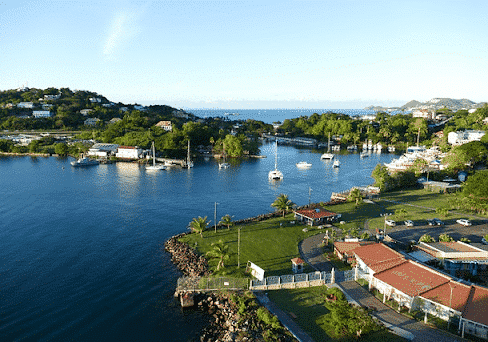Many opportunities to invest in St Lucia are available, from agro-processing and citizenship by investment (CBI) to renewal energy tourim. Whether you want to obtain economic citizenship through St Lucia’s CBI or capitalize on the thriving tourism industry, this article will take you through some of the best St Lucia investments in 2025.
St Lucia's Economic Profile
St Lucia’s economy is driven by its diverse yet small-scale industries: Tourism, agriculture, and offshore banking.
Country profile
Component | Statistic |
Political System | Independent, constitutional parliamentary democracy with general elections held every five years |
Total Area | 238 square miles |
Capital City | Castries |
Official Language | English |
Standard Time Zone | Atlantic Standard Time (UTC−4) |
Population | 183,251 (2022) |
Labor Force | 109,362 (2022) |
Unemployment Rate | 16.5 percent (2022) |
Economic statistics
Component | Statistic |
GDP | $2.03 billion (2022) |
GDP per capita | $13,980 (2023) |
Foreign Direct Investment Inflows (GDP percentage) | 5.5 percent (2023) |
Total Exports | $53.5 million (2022) |
Total Imports | $935.65 million (2022) |
Official Currency | Eastern Caribbean Dollar (EC or XCD) |
Inflation, Consumer Prices (Annual percentage) | 4.1 percent (2023) |
National Debt to GDP Ratio | 74.25 percent (2022) |
Source: Central Statistical Office of Saint Lucia, Statista, International Monetary Fund (IMF), World Bank, Observatory of Economic Complexity
Why invest in St Lucia?
Global connectivity
Through membership in the CARICOM and OECS and numerous trade agreements, investors in St Lucia are connected to economies worldwideDeveloped infrastructure
The St Lucia government has invested in efficient and modern infrastructureFavorable taxes
St Lucia tax incentives for investors include no worldwide income, capital gains, wealth, or inheritance taxesService-oriented culture
St Lucian culture is service-oriented, with a workforce who speak English as the primary languageGrowing tourism
St Lucia's tourism industry is growing, reflected in a 27 percent increase in arrivals in August 2024 compared to the same period in the previous yearPolitical stable
St Lucia's political system ensures stable governance, with long-standing political and economic stabilityCitizenship by investment
Foreign nationals can invest $240,000 and obtain St Lucia dual citizenship through the St Lucia citizenship by investment programAbundant natural resources
St Lucia is a country rich in natural resources, including minerals (pumice), mineral springs, and a geothermal potentialDiverse real estate benefits
Approved St Lucia real estate investment is an opportunity to capitalize on the country's growing tourism and stable economy, as well as qualify as an investment to be granted citizenshipKey Sectors in St Lucia
There are many reasons to invest in the Caribbean island of Saint Lucia. Foreign investors can choose from various sectors on the island that speak to the sustainable and profitable development of diverse projects and industries, such as high-end real estate, agro-processing, renewable energy, and smart manufacturing. The key sectors include:
Tourism and hospitality
According to Moody’s Analytics, tourism accounts for 65 percent of St Lucia’s GDP. The tourism industry in St Lucia revolves around cruise vacations and luxurious all-inclusive beach resorts, with nearly 50 percent of the population directly or indirectly employed within the industry.
Manufacturing and agro-processing
The abundant natural resources and plant biodiversity in St. Lucia have led to the rise of manufacturing companies, especially in agro-processing, distillation, and brewing, gaining global recognition.
Global business process outsourcing
With a highly educated workforce and skilled customer service professionals, Saint Lucia is the ideal destination for business and knowledge process outsourcing (BPO/KPO) investments in the Caribbean. Since the early 2000s, the sector has grown rapidly and now employs over 3,000 St Lucians. This growth was facilitated by the increased availability of reliable technology and infrastructure, a solid legal and regulatory framework, a stable macroeconomic environment and business reforms of the 90s.
St Lucia has many opportunities for foreign investors looking to obtain dual citizenship and qualifying investments in approved real estate projects can lead to profitable rental yields.
Rules of Investment in Saint Lucia
Local and foreign investment in St Lucia is defined through the nation’s legal and regulatory framework, such as the Companies Act (which provides comprehensive legislation regarding the formation and operation of companies), tax laws (which provide information and guidance on corporate taxes, incentives, and exemptions), and investment regulations (which provide rules and guidelines for foreign investment in the country).
The Saint Lucia Citizenship by Investment Program (or CBI program) is ratified by the Citizenship by Investment Act no.14 of 2015. St Lucia’s Citizenship by Investment Program offers qualifying investors and their families St Lucian citizenship and the ease of making a business investment in St Lucia and other Eastern Caribbean countries in exchange for investing at least $240,000 in the economy.
Full supported investments
Invest Saint Lucia (ISL) plays an active role in facilitating and promoting foreign investment opportunities in St Lucia by providing comprehensive support to investors through streamlining processes for obtaining permits and licenses across various industries. Invest Saint Lucia offers investment incentives like tax breaks tied to investment amounts and jobs created, duty-free concessions and exemptions on capital items, and fee-free repatriation of capital, profits, and dividends, making it financially attractive for investors.
Saint Lucia tax exemptions for expats
Saint Lucia residents and citizens benefit from the favorable St Lucia tax regime. There is no capital gains tax, inheritance or wealth tax on worldwide income or assets. However, local tax considerations do apply. Residents of Saint Lucia pay a personal income tax (PIT) scale deriving from domestic activities. Non-residents pay taxes only on income received from local sources.
Property tax is 0.25 percent of the market value of housing. Buyers of St Lucia real estate who are non-residents of Saint Lucia should additionally obtain an Alien Landholding License for land ownership, paying 7.5 percent of the property value.
St Lucia Citizenship by Investment Program
In 2015, the Government of St Lucia introduced its very own Citizenship by Investment Program. In fact, it is one of only five Caribbean countries that offer citizenship by investment programs.
The terms of the St Lucia investment citizenship program are straightforward. The minimum investment required is $240,000 and must be invested in the government’s economy through one of four established investment routes. Each investment route – real estate investment, government bond investment, government fund donation, or investment in an approved enterprise project – has its own requirements and associated fees, which will be discussed below.
In exchange for this qualifying investment, individuals and their qualifying dependent family members will receive a St Lucia passport. A benefit of St Lucia vs Dominica citizenship by investment is applicants can reclaim their initial investment with the government bonds option.
A St Lucia passport gives you permanent citizenship in one of the most beautiful Caribbean islands, with many tax exemptions and benefits, and the ability to travel to 148 St Lucia passport visa free countries, including such as the EU, Singapore, and Hong Kong. This visa free access can be particularly beneficial if you travel frequently, but your current passport allows for limited global mobility.
The St Lucia Citizenship by Investment Unit (CIU) manages the St Lucia CBI program. To be granted St Lucia citizenship by investment, four investment routes are available to applicants:
National Economic Fund donation: The St Lucia National Economic Fund was created to receive contributions for government-sponsored projects. To receive St Lucia citizenship for a single applicant or family of up to four, the non-refundable contribution amount is $240,000. Additional government fees include due diligence fees, processing fees, and passport fees.
Pre-approved real estate purchase: To qualify for St Lucia citizenship by real estate investment, the main applicant must invest at least $300,000 in pre-approved high-end branded hotels and resorts or a boutique property. In addition to due diligence and passport fees, you will incur a government application fee when pursuing the real estate investment route.
Enterprise investment: Applicants who choose to invest in approved enterprise projects have seven options available to them. They can invest in specialty restaurants, cruise ports and marinas, agro-processing plants, pharmaceutical products, ports, bridges, roads and highways, research institutions and facilities, and offshore universities. A single applicant must invest at least $3.5 million. Joint investments require a $1 million investment for a $6 million total investment. This route includes a government fee, due diligence fee, processing fee, and passport fee.
Government bonds acquisition: Applicants and their family members can get St Lucia citizenship by purchasing national action government bonds. The government bonds will be registered and must remain in the applicant’s name for five years. An applicant has to invest at least $300,000 in government funds. This route includes a government fee, due diligence fee, processing fee, and passport fee.

Saint Lucia Investment Opportunities
Invest Saint Lucia (ISL) is the official investment promotion agency responsible for stimulating, facilitating, and promoting investment opportunities. On their website, you’ll find information relating to investing in the country’s different sectors.
Tourism
St Lucia is a fantastic place to invest in tourism, and it is presently the leading tourist destination of the OECS. Firstly, the island’s incredible beauty has attracted tourists from all over the world. Its iconic Piton mountains – a UNESCO World Heritage Site – crystal clear blue waters, impressive waterfalls, and enchanting tropical rainforest are major appeals to nature lovers.
The island is well connected to the rest of the world, having two international airports – Hewanorra International Airport and George F.L Charles Airport – with direct flights to the US, Europe, Canada, and South America – and two seaports. Tourism growth is reflected in American Airline’s statement that it will increase flight frequency to St Lucia from the United States in December 2024.
St Lucia Visitor Arrivals and Expenditure (2020 - 2023) Year: 2020 2021 2022 2023 Annual Visitors: 458,943 301,675 736,955 1,047,293 Annual Visitor Expenditure ($EC): Not recorded $1.52 billion $2.84 billion $3.06 billion Source: Central Statistical Office of Saint Lucia
There are many high-end real estate investment opportunities thanks to the nation’s thriving tourism industry, with projects such as Black Bay, River Doree, and Marigot Waterfront providing investors the chance to develop accommodations in areas such as luxury and eco-tourism.
Manufacturing
As a member of the Caribbean Community (CARICOM), St Lucia has privileged access to the international market due to its numerous trade agreements, such as the Caribbean Community Single Market and Economy (CSME) and the Organization of Eastern Caribbean States (OECS). It also has trade and economic partnership agreements with the European Union countries, the US, Central America, and Canada.
The nation maintains Free Zone Areas that provide incentives and facilities for export-oriented businesses and promote foreign direct investment in the Caribbean island. The manufacturing sector welcomes investments in agro-processing, green technology innovations, beverage brewing, bottling and distilling, electronic assembly, textiles, and carbon fiber high-speed boats.
Infrastructure
St Lucia is focused on improving its renewable energy infrastructures – especially in the geothermal sector and the health sector. There are also many educational institutions that provide skilled labor and opportunities for workforce training. Local entrepreneurs and business networks also provide potential partnerships and local market insights.
St Lucia is actively looking for investments in the areas of renewable energy; roads, ports and bridges; Global Business Outsourcing and Knowledge Process Outsourcing (BPO and KPO); reputable offshore universities; hospitality, vocational and technology training institutions; medical research facilities; and ancillary health care facilities. Furthermore, specific infrastructure investments in St Lucia qualify investors and qualifying dependents for St Lucian citizenship.
How to invest in Saint Lucia?
The process for investing in Saint Lucia depends on the type of investment you want to make and the route.
Citizenship: The investment citizenship process in St Lucia requires applying through an Authorized Agent licensed by the St Lucia Citizenship Unit (CIU). The agent will conduct preliminary due diligence and submit your citizenship application on your behalf.
Real estate: International real estate investors must obtain an Alien Landholding Licence to purchase and own real estate in St. This involves applying to the Ministry of Physical Development, Housing, and Urban Renewal, and a local solicitor must register the application before final approval. Alternatively, investors can purchase government-approved property through the St Lucia citizenship by investment program, which has a separate process.
Business: Investing in a business in St Lucia requires completing the process of incorporation, including:
- Business name registration with the Registry of Companies and Intellectual Property (ROCIP)
- Establishing its legal structure (sole proprietorship, partnership, corporation, or LLC)
- Obtaining a trade license from the Ministry of Commerce, Manufacturing, Business Development, Cooperatives and Consumer Affairs
- Registering for a tax identification number from the Inland Revenue Department
Agriculture: In addition to the requirements to establish a legal entity, investing in St Lucia’s agriculture industry may require applying for environmental permits or licenses. Depending on the industry, this could be through the Saint Lucia National Conservation Authority or the Ministry of Agriculture.
Financial institution: To establish an offshore bank in St Lucia and obtain an offshore banking license, investors must apply directly to the Financial Services Regulatory Authority (FSRA). The licensing process includes paying application fees and a capital investment of at least $1 million.
Talk to a Specialist about Investing in St Lucia
Do you have questions about investing in St Lucia? Talk to one of our specialists here at Global Citizen Solutions.
Our dedicated team will work solely on your behalf. We are committed to providing a specialized service to each of our clients with the knowledge that comes with years of expertise, as well as access to a proprietary database of market information.
We give insight and data analysis to allow our clients to make investments with confidence.

Frequently Asked Questions about Investing in Saint Lucia
Is St Lucia a good investment?
Investing in St Lucia is promising due to the country’s stable political environment, favorable taxes, progressive economic policies, and growing tourism industry. Additionally, through investment in the Caribbean island and paying a due diligence and government administrative fee, investors can obtain St Lucia citizenship, expanding the advantages of a Saint Lucia investment.
One of the advantages of investing in St Lucia vs Antigua citizenship is the option to make infrastructure or government bond investments to obtain dual citizenship.
What kind of investment can I make in St Lucia?
There are multiple investment options in St Lucia. Through the St Lucia (CIP) citizenship by investment program, individuals can invest in the National Economic Fund, pre-approved real estate, approved enterprises, or government bonds. The fund option requires an investment of $240,000, whereas the real estate route requires a purchase worth at least $300,000.
Can foreigners buy property in St Lucia?
Foreigners can purchase property in St Lucia but must first apply for an Alien Landholding License (ALHL), which typically costs ten percent of the purchase price. Alternatively, the St Lucia citizenship by investment program is an option to buy property without an ALHL, provided the property is approved by the St Lucia Citizenship Unit (CIU).
How do you qualify for CIP in St Lucia?
Qualifying for the St Lucia Citizenship by Investment Program (CIP) requires being over 18 and passing due diligence checks, including criminal background checks, detailed analysis of bank statements and other financial documents, and a citizenship interview during the application process. Besides the character criteria, applicants must make a minimum donation of $240,000 to the government fund, invest $300,000 in real estate, invest $250,000 in a business, or acquire $300,000 worth of government bonds.
Additionally, applicants must submit their citizenship by investment application authorized agent licensed by the St Lucia Citizenship by Investment Unit (CIU).
How much debt is St. Lucia in?
According to the most recent data from Statista, St Lucia’s national debt in relation to GDP in 2022 was 74.25 percent.

 Joe Rice
Joe Rice 

